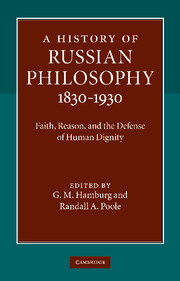Book contents
- Frontmatter
- Contents
- List of contributors
- Acknowledgments
- Introduction: The humanist tradition in Russian philosophy
- I The Nineteenth Century
- II Russian Metaphysical Idealism in Defense of Human Dignity
- III Humanity and Divinity in Russian Religious Philosophy after Solov′ëv
- IV Freedom and Human Perfectibility in the Silver Age
- V Russian Philosophy in Revolution and Exile
- Afterword: On persons as open-ended ends-in-themselves (the view from two novelists and two critics)
- Bibliography
- Index
Afterword: On persons as open-ended ends-in-themselves (the view from two novelists and two critics)
Published online by Cambridge University Press: 05 June 2012
- Frontmatter
- Contents
- List of contributors
- Acknowledgments
- Introduction: The humanist tradition in Russian philosophy
- I The Nineteenth Century
- II Russian Metaphysical Idealism in Defense of Human Dignity
- III Humanity and Divinity in Russian Religious Philosophy after Solov′ëv
- IV Freedom and Human Perfectibility in the Silver Age
- V Russian Philosophy in Revolution and Exile
- Afterword: On persons as open-ended ends-in-themselves (the view from two novelists and two critics)
- Bibliography
- Index
Summary
If Russian philosophy is at heart a human story, one more resembling a quest for “integral world views” than an abstract system or set of logical propositions, can the great Russian novelists be said to practice a type of homeland philosophy? The idea has long intrigued readers. In 2002, James Scanlan published his controversial Dostoevsky the Thinker, which presented its subject as an anthropocentric theist probing the “mystery of man” (and the existence of God) by routes more compatible with Kant than with Russian Orthodox mysticism. Lev Tolstoi, during his final decades, experimented with a vast array of fictional, memoiristic, and journalistic genres to communicate with his readership persuasively, intimately, in utmost sincerity – and his contribution to secular and religious philosophy has been a node of dispute and inspiration ever since. But this close overlap, almost a palimpsest, between literary creativity and philosophy proper is of a special sort. It is not only that Russian novelists also wrote polemical treatises, the way Vladimir Solov′ëv “also wrote poems” and Sergei Bulgakov also produced insightful literary criticism. Rather, the very stuff of Russian fiction, its created heroes and worlds, has been recruited wholesale and reclassified as philosophy without changing a word, by later readers and even by the authors themselves.
Examples are legion. Part One of Dostoevskii's “Notes from Underground” routinely turns up in textbooks on the foundations of Existentialism.
- Type
- Chapter
- Information
- A History of Russian Philosophy 1830–1930Faith, Reason, and the Defense of Human Dignity, pp. 381 - 390Publisher: Cambridge University PressPrint publication year: 2010

